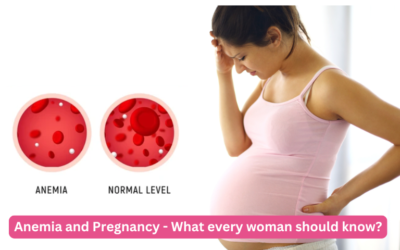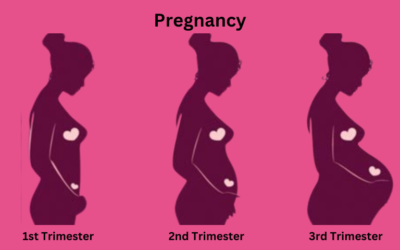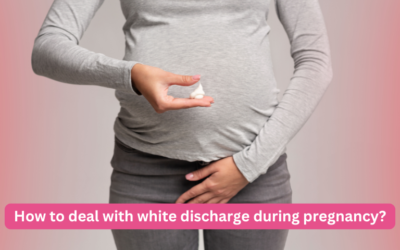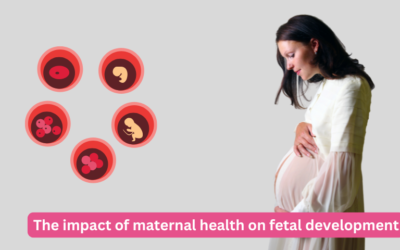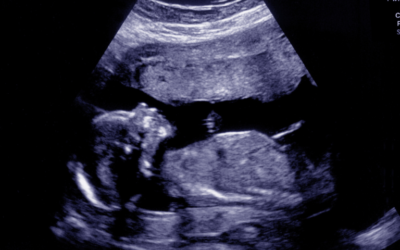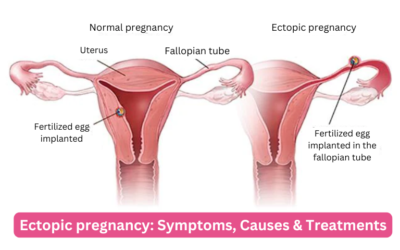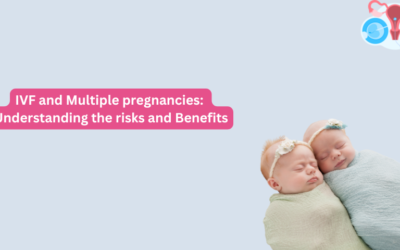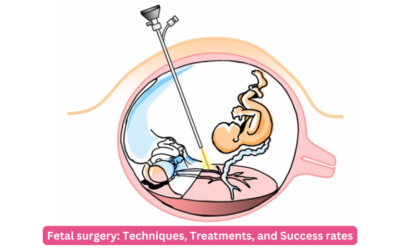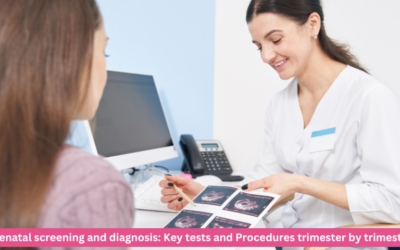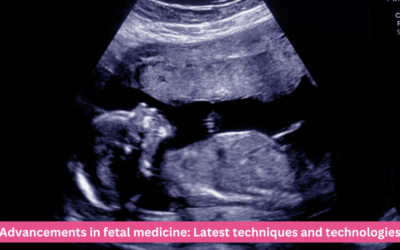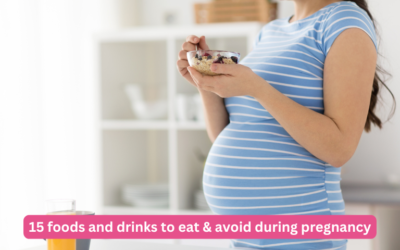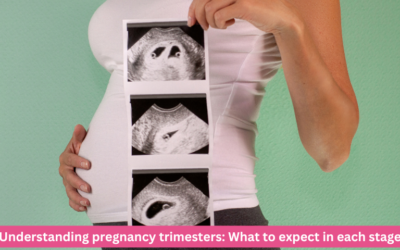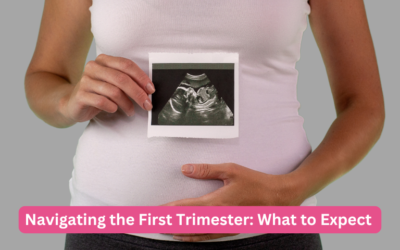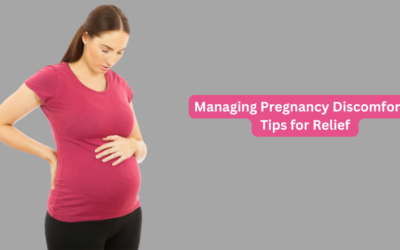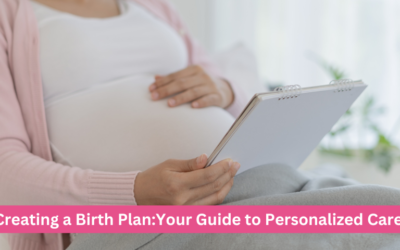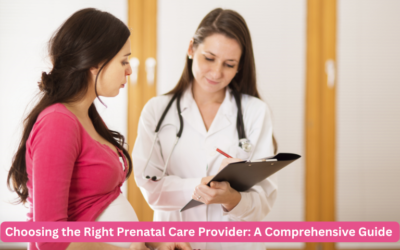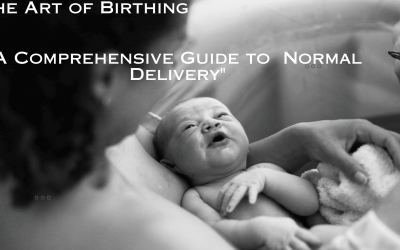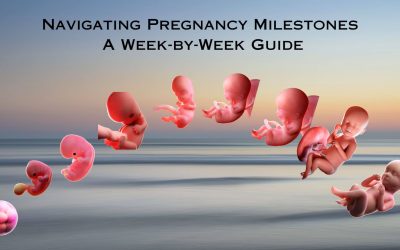What is a Twin Pregnancy?
A twin pregnancy occurs when a woman carries two fetuses simultaneously. This can happen in several ways, with the two most common being:
- Identical Twins (Monozygotic): These occur when a single fertilized egg splits into two embryos, resulting in genetically identical twins.
- Fraternal Twins (Dizygotic): These occur when a woman releases two eggs, and each is fertilized by a separate sperm cell. Fraternal twins can be different genders and genetically distinct from one another.

Symptoms of Twin Pregnancy
When expecting twins, you may experience some common symptoms earlier and more intensely than a singleton pregnancy. These can include:
- Increased fatigue.
- Heightened morning sickness.
- More noticeable weight gain.
- A larger and earlier bump.
- Increased fetal movement.
Our healthcare professionals are here to guide you through managing these symptoms and ensuring a comfortable journey.
Complications of Twin Pregnancy
Twin pregnancies can have increased risks, such as:
- Preterm labor: More common in twin pregnancies.
- Gestational diabetes: Higher risk compared to singleton pregnancies.
- Anaemia: Increased demands on the mother’s body during pregnancy.
- Pre-eclampsia: Elevated blood pressure and protein in urine.
How can I get pregnant with twins?
Certain factors may increase the likelihood of a twin pregnancy, such as:
- Family history of twins.
- Advanced maternal age.
- Use of fertility treatments, including hormone therapies or in vitro fertilization (IVF).
How is a Twin Pregnancy confirmed?
A twin pregnancy is confirmed through various medical tests and examinations conducted by healthcare professionals. Here are some common methods used to confirm a twin pregnancy:
- Ultrasound Examination:
- Transvaginal ultrasound:This is often the first method used in early pregnancy. It provides a clearer view of the uterus and can detect multiple gestations.
- Abdominal ultrasound:
- HCG (Human Chorionic Gonadotropin) Testing:
- Elevated levels of HCG in the blood can sometimes indicate a twin pregnancy.
- Elevated levels of HCG in the blood can sometimes indicate a twin pregnancy.
- Clinical Signs and Symptoms:
- Symptoms such as increased nausea, fatigue, and a larger uterus can be more pronounced in a twin pregnancy, indicating the possibility of carrying two fetuses.
- Symptoms such as increased nausea, fatigue, and a larger uterus can be more pronounced in a twin pregnancy, indicating the possibility of carrying two fetuses.
- Physical Examination:
- A healthcare provider may detect a larger-than-expected uterus during routine physical exams, suggesting a possible twin pregnancy.
- A healthcare provider may detect a larger-than-expected uterus during routine physical exams, suggesting a possible twin pregnancy.
- Blood Tests:
- Blood tests can monitor hormone levels and other markers that can suggest the presence of twins.
These diagnostic methods help healthcare providers confirm a twin pregnancy and monitor the overall health and development of the fetuses throughout the pregnancy.
How are Twins delivered?
Twins can be delivered through various methods depending on factors such as the position of the babies, the health of the mother, and any potential complications. Here are the common methods of delivery for twins:
-
Vaginal Delivery (Unassisted):
- Ideal scenario: If both twins are in a favorable position (typically head down), a vaginal birth for both twins can be attempted without the need for assistance.
- Monitoring: Continuous monitoring of both babies’ heart rates and the progress of labor is essential to ensure their well-being throughout the process.
- Ideal scenario: If both twins are in a favorable position (typically head down), a vaginal birth for both twins can be attempted without the need for assistance.
-
Vaginal Delivery (Assisted):
- Breech or Transverse presentation: If the first twin is in a breech (bottom-down) or transverse (sideways) position, or if complications arise during labor, an assisted vaginal birth may be performed.
- Forceps or Vacuum: Instruments like forceps or vacuum extraction may be used under medical supervision to assist in delivering the baby safely.
- Breech or Transverse presentation: If the first twin is in a breech (bottom-down) or transverse (sideways) position, or if complications arise during labor, an assisted vaginal birth may be performed.
-
Cesarean Section (C-Section):
- Scheduled: In some cases, a C-section may be scheduled if there are known complications or if the babies are not in a favorable position for a vaginal birth.
- Emergency: If complications arise during labor, such as fetal distress or problems with the umbilical cord, an emergency C-section may be performed to ensure the safety of both babies and the mother.
- Scheduled: In some cases, a C-section may be scheduled if there are known complications or if the babies are not in a favorable position for a vaginal birth.
-
Combined Delivery:
- Sometimes, the method of delivery for each twin may differ. For example, the first twin may be delivered vaginally, while the second twin requires a C-section due to complications or unfavorable positioning.
- Sometimes, the method of delivery for each twin may differ. For example, the first twin may be delivered vaginally, while the second twin requires a C-section due to complications or unfavorable positioning.
-
Delivery Room Setup:
- Team preparation: Hospitals with experience in twin deliveries typically have specialized teams ready to handle simultaneous births and potential complications.
- Post-delivery care: Immediate postpartum care includes assessing both babies for any immediate health concerns and ensuring the mother’s well-being.
- Team preparation: Hospitals with experience in twin deliveries typically have specialized teams ready to handle simultaneous births and potential complications.
The method of delivery for twins is determined based on individual circumstances and is often discussed and planned with healthcare providers during prenatal care. Factors such as the health of the mother, the position of the babies, and any potential risks are carefully considered to ensure a safe and successful delivery.
Why choose Shukan Hospital & IVF Centre in Ahmedabad for Twin Pregnancy Care?
- Our experienced team specializes in providing personalized care for twin pregnancies, ensuring you receive the highest standard of medical attention.
- Our state-of-the-art medical facilities are equipped with the latest technology, allowing us to offer comprehensive monitoring and advanced diagnostics throughout your pregnancy journey.
- We create a personalized care plan to meet the unique needs of a twin pregnancy, including more frequent prenatal visits to monitor both your health and the well-being of your babies.
- Our skilled obstetricians have extensive experience managing twin pregnancies, ensuring you receive the best possible guidance and support during labor and delivery.
- We offer a range of delivery options, including vaginal delivery with close monitoring and cesarean section, tailored to your specific circumstances and preferences.
- Our postpartum care team provides tailored support to help you manage the early days at home and ensure a smooth transition into parenting your twins.
FAqs
Can I have a natural birth with twins?
Yes, many women can have a natural birth with twins. However, it depends on various factors, such as the position and health of the twins.
Are there any dietary recommendations for a twin pregnancy?
Yes, maintaining a balanced diet with additional calories, vitamins, and minerals is essential for a twin pregnancy. Your healthcare provider can offer specific guidelines.
How many weeks is best to deliver twins?
Typically, twins are delivered around 36 to 38 weeks, depending on the health of both the mother and the babies. This timing allows for adequate fetal development while minimizing potential complications.
Which delivery is best for twins?
The choice between vaginal delivery and C-section for twins depends on various factors, including the position of the babies, overall health, and any potential complications. Healthcare providers will guide you in selecting the safest option for you and your babies.
Is twin delivery more painful?
Twin deliveries can involve more intense sensations due to the additional strain and pressure on the body. However, your healthcare provider will work with you to manage pain and discomfort during labor and delivery.
Will I need additional prenatal visits for a twin pregnancy?
Yes, your prenatal care may involve more frequent visits to monitor both you and your babies closely.
Is a C-section more common in twin pregnancies?
Not necessarily. The mode of delivery depends on various factors, including the health and position of the twins.
What are the chances of having twins naturally?
The likelihood of a natural twin pregnancy varies based on factors like genetics, age, and ethnicity. Some women are more predisposed to releasing multiple eggs, increasing the chance of twins.
How soon can I find out if I'm pregnant with twins?
While a traditional pregnancy test will confirm a pregnancy, an ultrasound can typically detect twins as early as six weeks.
How does a twin pregnancy affect my body differently compared to a singleton pregnancy?
A twin pregnancy can cause increased strain on your body, such as additional weight gain, more prominent abdominal growth, and possible increased discomfort due to the larger uterus and the pressure on other organs.
Are there special birthing positions or techniques recommended for twin pregnancies?
Yes, certain birthing positions, such as side-lying or upright positions, may help during labor and delivery. Healthcare professionals may also guide optimal positions to facilitate a safer and smoother delivery.
Can lifestyle choices affect my chances of having a twin pregnancy?
While factors like genetics and age play a significant role, certain lifestyle choices, such as diet and physical activity, may contribute to hormone levels that could influence the likelihood of a twin pregnancy.
How long will I need to stay in the hospital after delivering twins?
The length of hospital stay after delivering twins can vary depending on the type of delivery, overall health, and recovery. Typically, women may stay between 2 to 4 days following a vaginal delivery and up to 5 to 7 days after a C-section.
What role does genetics play in having twins?
Genetics can play a role in the likelihood of having twins. If twins run in your family, you may be more predisposed to having a twin pregnancy.
Can I exercise during a twin pregnancy?
Yes, light to moderate exercise during a twin pregnancy can be beneficial. It’s essential to avoid strenuous activities and consult with your healthcare provider to ensure your exercise routine is safe.
Can I travel during a twin pregnancy?
Travel during a twin pregnancy may be safe in the earlier stages, but it’s essential to consult with your healthcare provider. Air travel, especially long-distance, should be avoided in the later stages.
Meet Our Specialists

Dr. Ajay Prajapati
MBBS (Bachelor of Medicine, Bachelor of Surgery), MS (Master of Surgery)
Specialities: IVF, Infertility, Fetal medicine
Experience: 10+ years
Language: English, Hindi, Gujarati
- Over a decade of hands-on experience in fertility and pregnancy challenges.
- Expert in advanced laparoscopy for minimally invasive surgeries.
- FOGSI-certified sonologist, ensuring accurate pregnancy assessments.
- Known for successful outcomes and trusted care in high-risk cases.
- Earned patient trust across Gujarat and beyond

Dr. Hardik Savaliya
MBB, DGO
Specialities: IVF, Male Infertility, Female Infertility
Experience: 5+ years
Language: English, Hindi, Gujarati
- Holistic approach to patient care, providing both medical treatment and emotional support.
- Focuses on empowering women with knowledge about their health.
- Expertise in infertility treatments like IVF, IUI, and other assisted reproductive technologies.
- Successfully treats couples with infertility issues.
- Competent in managing high-risk pregnancies, ensuring safety for mother and baby.
- Skilled in minimally invasive surgeries, offering effective solutions with quicker recovery times.
- Holds MBBS and DGO degrees, with in-depth knowledge in gynecology and obstetrics.

Dr. Payal Patel
MBBS, MD (Obstetrics & Gynecology), Fellowship in Advanced Ultrasonography course, Fellowship in Infertility, Endoscopy & Ultrasonography
Specialities: Obstetrician, Gynecologist and Infertility Specialist
Experience: 6+ years
Language: English, Hindi, Gujarati
- Expert in managing complex gynecological issues.
- Provides comprehensive infertility treatments.
- Known for a patient-centered approach with personalized care.
- Compassionate and dedicated to her patients’ well-being.
- Stays updated with the latest advancements in her field.
Testimonials
Blogs related to Obstetrics
Fetal Growth Monitoring: Why it’s crucial during pregnancy?
Pregnancy is a journey of immense joy and responsibility, where the health and growth of your unborn baby become a top priority. Among the many...
Understanding HCG levels in pregnancy
Human Chorionic Gonadotropin (HCG) is a key hormone that plays a vital role in early pregnancy. Often called the "pregnancy hormone," HCG is...
Anemia and Pregnancy – What every woman should know?
Pregnancy is a life-altering experience, full of joy and excitement, but also filled with challenges and adjustments. Among the various health...
How does your body change during pregnancy?
Pregnancy is one of the most profound experiences a woman can go through, both physically and emotionally. As your body prepares to bring a new life...
How to deal with white discharge during pregnancy?
During pregnancy, the body undergoes many changes, some of which can be surprising or even concerning if you're not familiar with them. One common...
Tests during pregnancy: What are the routine prenatal tests?
Pregnancy is an exciting journey, but it can also bring a lot of questions and concerns for expecting parents. One important aspect of prenatal care...
The impact of maternal health on fetal development
Maternal health plays a crucial role in ensuring a healthy pregnancy and optimal fetal development. From the moment of conception, the health of the...
Understanding the fetal anatomy scan: What to look for?
Pregnancy is an incredible journey filled with milestones that ensure the health and well-being of both the mother and baby. One such important...
Ectopic pregnancy: Symptoms, Causes & Treatments
Ectopic pregnancy is a rare but serious condition in which a fertilized egg implants outside the uterus, most commonly in one of the fallopian...
The ethics of fetal medicine: Navigating complex decisions
Fetal medicine is a rapidly evolving field that combines advancements in technology, medical knowledge, and ethical considerations. As we strive to...
IVF and Multiple pregnancies: Understanding the risks and Benefits
In vitro fertilization (IVF) has brought hope to countless couples seeking to build families. However, one of the more complex aspects of IVF is the...
Fetal medicine and Birth planning: A professional guide to preparing for delivery
Fetal medicine plays a crucial role in modern obstetrics, offering invaluable insights into the health and development of the fetus. It enables...
Fetal surgery: Techniques, Treatments, and Success rates
Fetal surgery is a revolutionary field in medicine that addresses birth defects and other conditions while a baby is still in the womb. With...
Prenatal screening and diagnosis: Key tests and Procedures trimester by trimester
Prenatal screening and diagnostic tests are essential for monitoring the health of both the mother and baby during pregnancy. These tests help...
Advancements in fetal medicine: Latest techniques and technologies
The field of fetal medicine has experienced incredible advancements in recent years, offering pregnant women and their unborn babies more precise...
Difference between 3D and 4D sonography: Which one is right for you?
Sonography has become an integral part of prenatal care, helping expectant parents and doctors monitor the development of the fetus in real time....
15 foods and drinks to eat & avoid during pregnancy
Pregnancy is a special time that calls for extra attention to your diet. What you eat not only affects your health but also the development of your...
Understanding pregnancy trimesters: What to expect in each stage
Pregnancy is a remarkable journey, divided into three trimesters, each bringing its own set of changes, challenges, and milestones. At Shukan...
Preparing for Pregnancy: Essentials steps to take
At Shukan Hospital and IVF Center, we understand that preparing for pregnancy is an exciting and significant journey. Taking the right steps before...
Navigating the First Trimester: What to Expect
The first trimester of pregnancy is an exciting and transformative period, filled with anticipation and many changes. This phase, spanning from...
Managing Pregnancy Discomforts: Tips for Relief
Pregnancy is a beautiful journey that brings immense joy, but it also comes with its share of physical and emotional challenges. At Shukan Hospital...
Creating a Birth Plan: Your Guide to Personalized Care
Creating a birth plan is an empowering step in your pregnancy journey, allowing you to outline your preferences and make informed decisions about...
Common Pregnancy Myths: Debunking Misconceptions
We know that pregnancy is an exciting and emotional journey. With all the advice and stories you hear from friends, family, and even strangers, it...
Choosing the Right Prenatal Care Provider: A Comprehensive Guide
Choosing the right prenatal care provider is a critical decision that significantly impacts your pregnancy journey and the health of both you and...
The Art of Birthing: A Comprehensive Guide to Normal Delivery
Introduction Welcome to Shukan Hospital and IVF Center comprehensive guide to embracing natural childbirth. Welcoming a new life into the world...
Navigating Pregnancy Milestones: A Week-by-Week Guide
Introduction:Embarking on the miraculous journey of pregnancy is a momentous experience, and Shukan Hospital and IVF Centre proudly stands as your...
Unlocking the Power of Maternal Mental Health: A Path to Positive Pregnancy Outcomes
IntroductionMental health during pregnancy is a topic gaining significant attention in recent years. It's not just about the physical aspects of...
The Importance of Early Pregnancy Scans: Ensuring a Healthy Journey
Pregnancy is a uniquely special time, filled with excitement and joy.The wonder of early pregnancy is often accompanied by new feelings, new...
Fertility specialist or Gynecologist? Which is right for you?
When you are trying to conceive, it is understandable to wonder when and which doctor to consult. Patient confusion tends to originate from the fact...



